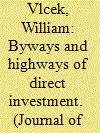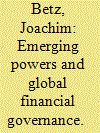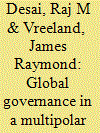|
|
|
Sort Order |
|
|
|
Items / Page
|
|
|
|
|
|
|
| Srl | Item |
| 1 |
ID:
102449


|
|
|
|
|
| Publication |
2010.
|
| Summary/Abstract |
This paper examines a lacuna in the literature on foreign direct investment (FDI) flows to China: the absence of analysis for the prominent location of small Caribbean and Pacific islands as leading sources of FDI. An indeterminate amount of domestic capital is embedded in these FDI flows, which distorts comparative studies on FDI in developing economies between China and other states. Direct investment from China has also increased in recent years and offshore financial centres (OFCs) often serve as the initial destinations. This paper excavates the rationales behind the presence of OFCs and suggests that Chinese actors will emulate the practices of developed state multinational corporations and high-net-worth individuals. The implications of these investment practices are outlined along with possible trajectories for their impact on the process of financial liberalisation in China. Consequently, it encourages increased Chinese participation in the development of global financial governance.
|
|
|
|
|
|
|
|
|
|
|
|
|
|
|
|
| 2 |
ID:
130721


|
|
|
|
|
| Publication |
2014.
|
| Summary/Abstract |
The traditional mode of governance of national and global monetary and financial markets was obviously too weak and piecemeal to hinder the recurrent outbreak of regional and worldwide crises. The latest and gravest in this series triggered a massive institutional and operational overhaul, achieved both by the creation of new institutions and also by old and new ones being made stronger and more inclusive, foremost by introducing major emerging countries into their steering and oversight bodies. During this endeavour, national and institutional self-interests were initially subdued, but would come out forcefully later. As a consequence, the new edifices for multilateral market regulation and surveillance, as well as its financing, went only as far as the difficult compromise of an enlarged body of players would allow. Therefore, regional solutions or cooperation between like-minded countries were often seen as alternatives to a strong multilateral understanding, but are only able to complement the existing international monetary and financial system.
|
|
|
|
|
|
|
|
|
|
|
|
|
|
|
|
| 3 |
ID:
103257


|
|
|
|
|
| Publication |
2011.
|
| Summary/Abstract |
The reform of global financial governance is long overdue. Recent changes to the governance of the International Monetary Fund partially address the lack of representation of emerging market countries, but not their loss of confidence in the institution. In the meantime, alternative and perhaps better approaches to the problems of open economics are being proposed at a regional level. We describe these regional monetary funds and discuss their prospects. We conclude that because economic interdependence is strongest at the regional level, regional cooperation seems well-suited to a multipolar world.
|
|
|
|
|
|
|
|
|
|
|
|
|
|
|
|
| 4 |
ID:
153394


|
|
|
|
|
| Summary/Abstract |
A holism tendency in International Relations (IR) studies treats international systems and states as unitary wholes and thus leads to a tripartite view on China’s international role as either a revisionist, status quo or a pragmatist power. China’s stances in global financial governance (GFG), however, are inconsistent, which indicates that China is not a pure challenger or status quo power. These inconsistent stances do not allude to China being a pragmatist power, which makes policies and takes actions in a practical and matter-of-fact way without consistent national interests. Instead, China has inconsistent stances but consistent core national interests. The ostensible contradiction is due to the explanatory deficiency of the IR holistic tendency, which pays inadequate attention to fragmentations of international and domestic systems.
|
|
|
|
|
|
|
|
|
|
|
|
|
|
|
|
| 5 |
ID:
189482


|
|
|
|
|
| Summary/Abstract |
In the wake of the Asian Financial Crisis, East Asia’s efforts to enhance regional financial cooperation raised the possibility of East Asia playing a more assertive role in global financial governance. However, despite the region’s increased voice in governance and economic weight, East Asian financial systems and markets have mostly adapted to global norms developed in New York, London, and Washington, DC. We argue that the failure of East Asia to push an alternative vision of financial governance reflects both the lack of regional political unity and, more crucially, the divisions of interests both between and within key East Asian economies. Despite nearly universal regional dissatisfaction with global standards and institutions in the wake of the Asian Financial Crisis, these two factors have combined to prevent the development of a distinctive regional model that could be promoted at the global level.
|
|
|
|
|
|
|
|
|
|
|
|
|
|
|
|
| 6 |
ID:
104353


|
|
|
|
|
| Publication |
2011.
|
| Summary/Abstract |
Financial crises underline the necessity for more effective global governance. Despite the creation of the Basel II Accord, no agreement has been reached on the reform of the International Monetary Fund (IMF). Why do governments only selectively agree to reform global governance? I argue that convergence and divergence of governmental positions cannot be explained solely by the logic of the international system, institutions or globalization. Instead, they strongly reflect domestic ideas and interests. Furthermore, the ability of governments to compromise internationally is influenced by the different impact of domestic ideas and interests. With regard to their prevalence in domestic preference formation, ideas prevail when governance affects lobby groups diffusely and poses fundamental questions on the role of politics in governing the economy. Interests prevail when lobby groups are affected directly and new governance concerns a specific distribution of costs. These arguments are tested on the preference formation of the United States and German governments on the IMF and Basel II.
|
|
|
|
|
|
|
|
|
|
|
|
|
|
|
|
| 7 |
ID:
096247


|
|
|
|
|
| Publication |
2010.
|
| Summary/Abstract |
A growing number of respected commentators now argue that regulatory capture of public agencies and public policy by leading banks was one of the main causal factors behind the financial crisis of 2007-2009, resulting in a permissive regulatory environment. This regulatory environment placed a faith in banks own internal risk models, contributed to pro-cyclical behaviour and turned a blind eye to excessive risk taking. The article argues that a form of 'multi-level regulatory capture' characterized the global financial architecture prior to the crisis. Simultaneously, regulatory capture fed off, but also nourished the financial boom, in a fashion that mirrored the life cycle of the boom itself. Minimizing future financial booms and crises will require continuous, conscious and explicit efforts to restrain financial regulatory capture now and into the future. The article assesses the extent to which this has been achieved in current global financial governance reform efforts and highlights some of the persistent difficulties that will continue to hamper efforts to restrain regulatory capture. The evidence concerning the extent to which regulatory capture is being effectively restrained is somewhat mixed, and where it is happening it is largely unintentional and accidental. Recent reforms have overlooked the political causes of the crisis and have failed to focus explicitly or systematically on regulatory capture.
|
|
|
|
|
|
|
|
|
|
|
|
|
|
|
|
| 8 |
ID:
097841


|
|
|
|
|
| Publication |
2010.
|
| Summary/Abstract |
This paper analyzes and assesses the "Principles for Stable Capital Flows and Fair Debt Restructuring in Emerging Markets," which have emerged as an important instrument for crisis prevention and crisis resolution in the international financial system. The paper argues that, notwithstanding their low profile, the Principles which were jointly agreed between key sovereign debtors and their private creditors in 2004 have proved to be a useful instrument in spite of their voluntary and non-binding nature. Indeed, an increasing number of sovereign debtors and private creditors have adopted the Principles' recommendations on transparency and the timely flow of information, close dialogue, "good faith" actions, and fair treatment. The paper, taking a rational choice perspective, appraises the Principles as the product of a transnational public-private partnership as well as a soft mode of governance. Moreover, it shows how the Principles have moved somewhat along the continuum of soft law and hard law toward the latter. Finally, the paper makes the case that the Principles and their design features can provide some lessons for the current international policy debate on codes of conduct in global financial regulation.
|
|
|
|
|
|
|
|
|
|
|
|
|
|
|
|
|
|
|
|
|